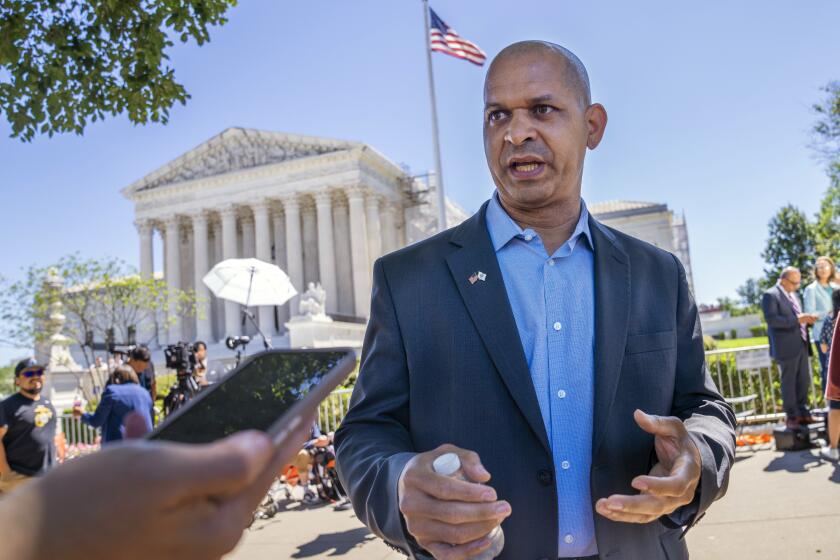Alyeska Faces Fresh Allegations of Spying on Whistle-Blowers
New allegations have surfaced that a security firm hired by the operator of the trans-Alaska pipeline used lies, electronic surveillance, reviews of private records and a phony environmental group in an investigation designed to ferret out whistle-blowers.
In addition, Alyeska Pipeline Service Co., a consortium of seven oil firms, employed Florida-based Wackenhut Corp. to target Rep. George Miller (D-Martinez), chairman of the House committee investigating alleged environmental wrongdoing by Alyeska, according to sources and sworn court statements.
Alyeska--whose 800-mile pipeline transports about one-fourth of the nation’s domestically produced oil--acknowledges hiring Wackenhut to conduct an investigation for at least several months in 1990. It has said the investigation was intended to identify possible leaks of documents by Alyeska employees to retired tanker broker Charles Hamel.
Hamel is a long-time industry gadfly who the company suspects of feeding embarrassing information on Alyeska’s environmental practices to Miller, the U.S. Environmental Protection Agency and the media.
At least one regulatory action, a $20,000 fine proposed by the EPA last month against Alyeska for illegal waste-water dumping, is attributable to information provided by Hamel. Hamel is also engaged in a lengthy civil suit against Exxon Corp., one of the Alyeska companies, in a business dispute.
Alyeska officials could not be reached for comment this weekend. But in an internal memorandum sent two weeks ago to Alyeska employees and obtained by The Times, company President James B. Hermiller denied that the firm or Wackenhut engaged in any illegal activity.
Officials at Wackenhut also deny any improper or illegal actions. Wackenhut has had a contract with Alyeska to provide security along the trans-Alaska pipeline since its start-up in 1977, said Wackenhut spokesman Patrick Cannan.
“Everything we did was perfectly legal and proper, and we look forward to a time when we can legally talk about it,” Wayne Black, who was in charge of Wackenhut’s special investigations division at the time, said in a telephone interview. Black, who is now vice president and executive director of investigations at Wackenhut, declined to answer specific allegations, citing a Florida law that prohibits discussions of a case without permission of the client.
Black and Cannan categorically deny that Miller was ever a target of the investigation or that any Wackenhut operatives attempted to meet with him.
Miller’s House Interior and Insular Affairs Committee has launched an investigation into Alyeska’s probe, code-named Case Number 427, and has asked both Alyeska and Wackenhut to turn over records on it by Sept. 6. Last week, a spokesman for Miller declined to comment on the status of the investigation.
In recent days, new details of the Alyeska investigation have emerged in sworn court statements by former Wackenhut employees, statements by other sources and interviews:
* Two phony offices were set up for a nonexistent environmental litigation firm called Ecolit Group near Hamel’s Virginia home and in Florida. Operatives posing as environmentalists befriended Hamel, who was in financial straits at the time, with the promise of financial aid and legal help.
* As many as 10 people worked on the investigation at different times, sources said. At one point, Hamel was told that real estate tycoon Donald J. Trump was on Ecolit’s board of directors.
* One operative, a woman who identified herself as an environmental journalist, tried to befriend Hamel in an Anchorage hotel bar in March, 1990, and later on an airline flight. The aim was to discover Hamel’s sources and also to “compromise him” in some way, court statements said.
* Operatives also conducted electronic surveillance of Hamel’s homes, his business and hotel rooms, reviewed his private telephone logs and consumer credit reports and searched his garbage and his home office.
The organizer of the investigation--who represented himself as Ecolit’s director “Dr. Wayne Jenkins” to Hamel--was in fact Wackenhut’s Black.
Some details of the investigation appear almost comical. While parked in front of Hamel’s home in Virginia, for example, a recreational vehicle full of electronic surveillance equipment received a parking ticket--while Black and Lund were working inside.
To plant bugs in one of the phony Ecolit offices on another occasion, undercover operatives rented an office down the hall, connected wires to a radio-controlled toy dune buggy and ran it through the ceiling over an intervening office to the Ecolit office, according to a sworn statement by former Wackenhut employee Sherree Rich. The intervening office housed a U.S. Naval intelligence operation.
Alyeska’s manager of corporate security, J. P. (Pat) Wellington, spoke at least twice a week with Black about the investigation and knew all of its specifics, Black said.
More to Read
Start your day right
Sign up for Essential California for news, features and recommendations from the L.A. Times and beyond in your inbox six days a week.
You may occasionally receive promotional content from the Los Angeles Times.






